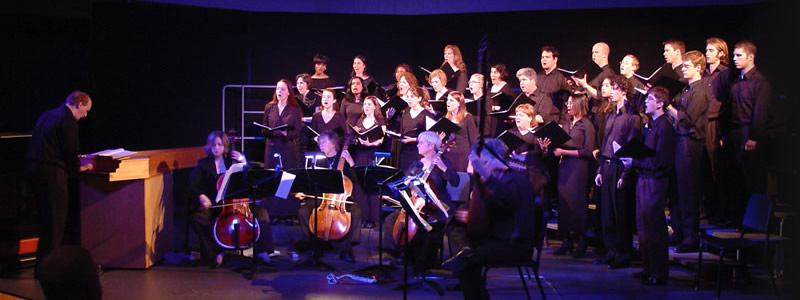About
the concert:
New Trinity Baroque, led by Predrag Gosta, will be joined by the Choir of Oxford College celebrating 400th birthday of the great Italian master, Giacomo Carissimi. The program will feature two most famous oratorios by the great composer, which influenced the development of oratorio style in Europe in the centuries to come.
Giacomo Carissimi was born in 1604 at Marino in the Papal States. He is considered to be the most influential and prolific Italian composer of his time. After completing his musical education in Rome, Carissimi became choirmaster at Assisi, and, in 1628, he was appointed to a like position at the church of St. Apollinaris in Rome. He is considered the father of the modern oratorio form, which had its origin in the simple laudi sacri composed by Palestrina and Annimuccia for St. Philip Neri's meetings of young people, held in his oratorio or place of prayer. By imparting a lyric quality to the recitative, lending variety to the orchestral accompaniments, and dramatic movement to the whole, he developed this form to the point where it was taken up and carried to its perfection by Handel and Bach. Although many of Carissimi's oratorios and other works have been lost, the Bibliothèque Nationale in Paris contains the following oratorios in manuscript: "Le mauvais riche", "Jonas". An almost complete collection of the works of this master made by Dr. Henry Aldrich (1647-1710) is found in the library of Christ church College, Oxford. Of Carissimi's settings to liturgical texts two printed collections of motets for two, three, and four voices, and masses for five and nine voices are mentioned. An eight-part "Nisi Dominus" and a "Lauda Sion" in manuscript are preserved in the Santini Library in Rome. Among Carissimi's pupils were Alessandro Scarlatti, J.K. Kerll, Johann Ph. Krieger, Chr. Bernard, and M.A. Charpentier. Carissimi died on the 12th of January, 1674, in Rome.
More information about Carissimi:
Giacomo Carissimi is recorded as a singer at Tivoli in 1623; two years later he was organist there. His first appointment as maestro di cappella came in 1628, at the S. Rufino Cathedral in Assisi. The following year he was callcd on by Bernardino Castorio in Rome to fill the post of maestro at the German College there, a prestigious post in which Victoria and Agazzari had served earlier. Carissimi spent the rest of his life at the college; he was ordained to the priesthood in 1637. His responsibilities included training the choirs and providing liturgical music for the adjoining S. Apollinare chapel. In 1655-56 he was given the title maestro di cappella del concerto di camera by the Queen of Sweden in exile in Rome; also during the 1650s he composed and conducted for the Oratorio del S. Crocifisso. Among his prominent pupils were Marc-Antoine Charpentier, Johann Kaspar Kerll, Christoph Bernhard, and possibly also Johann Philipp Krieger. That he was in a comfortable situation, both financially and professionally, is suggested by his rejection of several opportunities for prestigious employment, including the post at St. Mark's in Venice on Monteverdi 's death in 1643 and the position of maestro for the emperor's son, Leopold Wilhelm of Brussels. Carissimi chose to remain in Rome, and after 44 years of service to the College he died a rich man.
The first major composer of oratorios, Carissimi helped form the modem notion of the genre. He also composed hundreds of motets and cantatas in addition to Masses and other sacred works. Because no autograph manuscripts survive, problems of attribution in his oeuvre are especially difficult, as are problems of genre, especially in distinguishing between motet and oratorio. Among the oratorios are Damnatorum lamentatio (1666), Jephte (before 1650), Jonas, and Judicium Salomonis.
Venue:
Atlanta, St. Bartholomew's Episcopal Church,
8 PM
SEE
DIRECTIONS TO THE VENUES
Tickets:
Regular tickets - $25.00
Discounted* tickets - $15.00
Students - $5
(* Friends of New Trinity Baroque, Members
of Early Music Networt)
 Tickets
are available for purchase
ONLINE (all major credit cards accepted)
or via mail (please send a check payable to
New Trinity Baroque).
Tickets
are available for purchase
ONLINE (all major credit cards accepted)
or via mail (please send a check payable to
New Trinity Baroque).
Reservations
are welcome - please call 770 638-7574 (outside
of Atlanta, call toll free 1-866-EARLYMUSIC),
or email us at newtrinitybaroque@earlymusic.net.
CLICK
HERE
TO BUY TICKETS
THE OXFORD CHORALE
of Oxford College of Emory University
(Choir Director: Dr. Maria Archetto)
NEW
TRINITY BAROQUE:
on period instruments
(Artistic Director: Predrag Gosta)
Vocal Soloists:
Julia Matthews, soprano
Elizabeth Packard Arnold, soprano
Esther Kulp, soprano
Holly McCarren, alto
Magdalena Wor, alto
Kevin Sutton, tenor
Stephen Soph, tenor
Patrick Newell, baritone
Cameron Beauchamp, bass
Instrumental Soloists:
Martha Bishop, viola da gamba
Susan Patterson, viola da gamba
Christina Babich, violoncello
Michael Fields, chitarrone
William Hearn, lute
Brad Hughley, organ
Predrag
Gosta, harpsichord
Conducted by
Predrag Gosta



